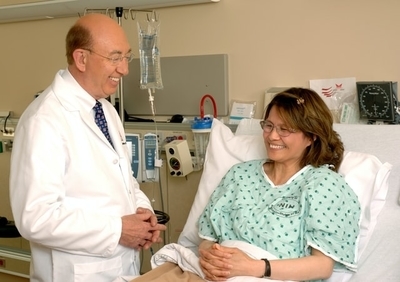Risk factors for colorectal cancer can vary based on a diverse group of factors. Age is the biggest factor, with a majority of patients aged 50 or older. The majority of patients being aged 50 or older. Family and personal medical history can both play a role and also provide insight into your own health. Lifestyle choices such as diet and exercise can also affect your risk of colorectal cancer. 
Colorectal Cancer Risk Factors
There are multiple factors that can contribute to your risk of developing colorectal cancer. Some factors can be controlled by taking easy preventative measures. Other factors are beyond the scope of what healthy lifestyle habits can address. Talk to your doctor about your risk of developing colorectal cancer to learn what you can be doing to help detect or possibly prevent it.
Risk factors for colorectal cancer include:
- Age
- Family history
- Personal medical history
- Lifestyle
Age
Age is the most significant risk factor for colorectal cancer. The average age for someone diagnosed with the disease is 64, and over 90% of those diagnosed are aged 50 or older. If you’ve been diagnosed with colorectal cancer then it’s highly likely that you have had it for years. It’s estimated that one in four people has colorectal cancer polyps by age 50.
Family History
You’re at a greater risk for developing colorectal cancer if you have a relative who has also had it, and your risk goes up if more than one family member has had it. While rare, some patients develop the disease due to inherited gene mutations. These result in syndromes such as familial adenomatous polyposis (FAP) and Lynch syndrome, which can increase your risk.
Personal Medical History
Your own personal medical history can help gauge your risk for developing colorectal cancer. Personal health issues that may increase your chances of developing colorectal cancer include:
- Inflammatory bowel disease
- Ulcerative colitis
- Crohn’s disease
- Ovarian cancer
- Breast cancer
- Endometrial cancer
Those of African, Hispanic, and Asian descent also tend to be more likely to be diagnosed with colorectal cancer during later stages of the disease.
Lifestyle
While hereditary risk factors for developing colorectal cancer are beyond your control, there are some preventative or cautionary measures that you can take. What you put in your body plays a big role in colorectal cancer risk as well as for your overall health.
Lifestyle factors that may increase your risk of colorectal cancer include:
- Not getting enough exercise
- Being overweight or obese
- Tobacco usage
- Alcohol consumption
- Not eating enough fruits and vegetables
- Not getting enough fiber in your diet
- Eating too many fats and processed meats
By making healthier lifestyle choices, you’ll be doing more than fighting colorectal cancer. You’ll be setting yourself up for a much longer, healthier life.
Colorectal Cancer in Indiana
According to the CDC, colorectal cancer is the third leading cause of cancer-related deaths in the United States. It’s also the third most common form of cancer for both men and women.
Colorectal cancer is particularly concerning in our home state of Indiana. For instance, a 2017 report from the CDC found that Indiana ranks at number 10 for cases of colorectal cancer per 100,000 people in the contiguous United States.
It’s important to note that Indiana reported the highest number of colorectal cancer cases out of the top 10. The report also shows that colorectal cancer is the fourth most common form of new cancer diagnoses as well as of cancer-related death in Indiana, regardless of sex or ethnicity.
Statistics like this show why it’s so important to understand your risk of colorectal cancer. By knowing your risk factors, you can develop a plan with your healthcare team to try and reduce your risk, as well as have a plan for surgery if it becomes necessary. Our team of surgeons can guide you through the process for the best results possible.
Colorectal Cancer Screenings
Early detection is key when it comes to the fight against colorectal cancer, which is why you need a colorectal cancer screening. Colorectal cancer screenings vary so it’s important to talk with your physician about which screening is right for you. This can be based on different factors including your family and personal health history.
Types of colorectal cancer screenings include:
- Colonoscopy
- Stool tests
- Sigmoidoscopy
Screenings for colon and colorectal cancer become increasingly important as you get older, so don’t put them off. As our own Dr. Anthony Kaiser explains:
Beginning around age 50, colon cancer screenings should be an important part of your healthcare routine. People with increased risk factors, such as a family history of colon cancer or inflammatory bowel disease, should consider earlier and more frequent screenings.
Colorectal Surgery in Evansville, Indiana
At Evansville Surgical Associates, we pride ourselves on providing the highest quality of care to our patients. Dr. Jay H Woodland and many of the other members of our surgical team have specialized in colorectal surgery in order to treat cancer as well as many other problems involving the colon, rectum, and anus. They work closely with our experts in gastroenterology and other related fields to provide you with top surgical care.
A variety of factors play a part in your chances of developing colorectal cancer, including age, family history, personal medical history, and lifestyle. This is especially important in Indiana where colorectal cancer is the fourth most common form of new cancer diagnosis and cause of cancer-related death, regardless of sex or ethnicity. Talk to your doctor about getting a colorectal screening today and learn how our surgical team can help you.
Want to know more about your surgical options for colorectal cancer? Contact us today to see how our surgeons at Evansville Surgical Associates can help you live a happy, healthy life.
Evansville Surgical Associates has been providing comprehensive and compassionate surgical care for over 50 years. Call us at (812) 424-8231 or (800) 264-823. We are available from 8:00 am to 4:30 pm if you would like to schedule an appointment.



